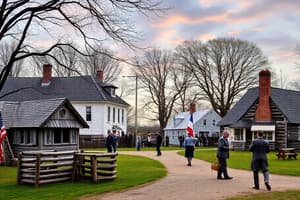Podcast
Questions and Answers
Who were the two main opposing forces in the American Revolution?
Who were the two main opposing forces in the American Revolution?
British soldiers and the Continental Army
What did the colonists want in terms of representation and decision making?
What did the colonists want in terms of representation and decision making?
Representation in their government and decision making
Where did the American Revolution primarily take place?
Where did the American Revolution primarily take place?
New England, middle regions, and Boston
When did the American Revolution take place?
When did the American Revolution take place?
Why did the American colonists revolt against the British?
Why did the American colonists revolt against the British?
What was the impact of the shortage of supplies on the Continental Army?
What was the impact of the shortage of supplies on the Continental Army?
How did General George Washington's leadership contribute to the strengths of the colonists?
How did General George Washington's leadership contribute to the strengths of the colonists?
What was the significance of the Declaration of Independence on the war?
What was the significance of the Declaration of Independence on the war?
How did the reading of Thomas Paine's pamphlet 'The Crisis' impact the morale of the colonists?
How did the reading of Thomas Paine's pamphlet 'The Crisis' impact the morale of the colonists?
What was the significance of the surprise victories at Trenton and Princeton for the colonists?
What was the significance of the surprise victories at Trenton and Princeton for the colonists?
Study Notes
Opposing Forces
- The two main opposing forces were the American colonists, known as the Patriots, and the British Empire, representing loyalists.
Colonists' Demands
- Colonists sought greater representation in British Parliament and decision-making power over their own affairs, opposing taxation without representation.
Geography of the War
- The American Revolution primarily took place in the Thirteen Colonies, encompassing areas from New England to the Southern Colonies.
Timeframe of the Revolution
- The conflict lasted from 1775 to 1783, officially beginning with the Battles of Lexington and Concord in April 1775.
Reasons for Rebellion
- The American colonists revolted against British rule due to oppressive taxation, restrictions on trade, and lack of representation, which they deemed unfair.
Supply Shortages Effects
- The Continental Army faced severe shortages of supplies, leading to weakened morale, inadequate resources for soldiers, and challenges in sustaining military campaigns.
Washington's Leadership
- General George Washington's leadership fostered unity among the colonies, inspired confidence in the military, and strategically coordinated efforts that enhanced the army's resilience.
Declaration of Independence Significance
- The Declaration of Independence, adopted in 1776, solidified the colonies' commitment to independence, rallied support, and justified the rebellion to both domestic and international audiences.
Impact of 'The Crisis'
- Thomas Paine's pamphlet 'The Crisis' boosted morale among the troops and civilians by emphasizing perseverance and resolve in the face of hardships.
Importance of Trenton and Princeton Victories
- The surprise victories at Trenton and Princeton rejuvenated the Patriot cause, proving that the Continental Army could defeat the British and encouraging more enlistments and support.
Studying That Suits You
Use AI to generate personalized quizzes and flashcards to suit your learning preferences.
Description
This study guide covers the 5 W's - who, what, where, when, and why - of the American Revolutionary War. It includes key figures such as the British soldiers, Continental Army, King George, and the colonists, as well as important events like the Treaty of Paris.




